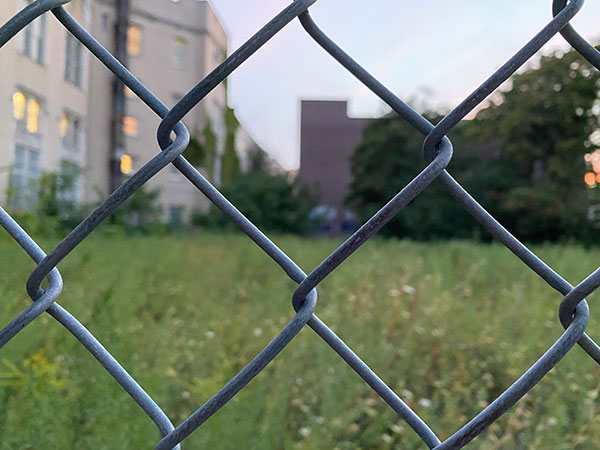
The Brooklyn lot in question
Our needs for housing, food security, health, and green open spaces are all critical. Therefore, city policies and planning must not pit these needs against each other.
Seldom considered are the health benefits provided by greenery. Connection with nature has been shown to reduce heart rate, blood pressure, and stress hormone levels, and positively impact the nervous system. Green vegetation in open social space is key for fortifying mental and physical health as we recover from the coronavirus pandemic.
One particular example where we live is emblematic of how city government must think differently about community space. This story has lessons for New York City. This site may not be in your community, but it is important for the city we all call home and other neighborhoods that may face similar choices.
Brooklyn’s “Block 5103, Lot 58” is a vacant lot at the heart of the historic Village of Flatbush. We believe that a community farm is the highest and best use of this 29,000-square-foot city-owned property at Church and Bedford Avenues. Such use would provide a more livable environment for current residents and would honor those who came before us: the Munsee Lenape and Canarsie peoples who walked this land, and the enslaved of African descent who are thought to have been buried on this lot.
Since 2015, when the dilapidated school building was demolished on the lot, nature has reclaimed this land. Previously, it was the site of the Flatbush District No. 1 School (1878), P.S. 90, and the Beth Rivkah Institute. Around 2006, it was discussed as the site for a Caribbean trade center and business incubator. In 2017, a Community Board 14 study identified this lot as potential green space in a district “ranked 58 out of 59 community districts in the rate of residential units that are within ¼ mile of a park.”
Now is the time to partner with nature to return this lot to the ecological richness of Lenapehoking in support of modern life. Here, neighbors would congregate to chill out and converse among green plants or recall the love of farming in distant ancestral lands. Children would grow, directly connected with nature; both young and old would learn local solutions to food insecurity. Everyone would compost food scraps to nurture the soil and recycle to protect the earth.
A community farm at this location would be the critical center in a community-based plan for a truly livable and affordable neighborhood. We join with local grassroots voices and progressive planners calling for prioritizing renovation and the upgrading of existing housing stock as well as the development of additional deeply affordable housing, based on the area median income, within a two- or three-mile radius.
In line with the real estate appraisal concept of highest and best use, this lot should be removed from the speculative real estate market and held by the Brooklyn-Queens Land Trust. A community farm would serve as a social hub and educational center for earth-serving careers of urban farming, composting, recycling and soil-rehabilitation. Regenerative farming practices that acknowledge the natural circularity of air, water, and soil would develop it at much lower financial and environmental costs. Organizationally, the community farm center could draw on the experience of such community-based organizations as CAMBA, Earth Matter, and East New York Farms, and would receive support from the city.
Currently, there is a consultation process with the expressed goal of developing 130 housing units on this lot. Conducted by the New York City Economic Development Corporation and Department of Housing Preservation and Development, and co-chaired by Borough President Eric Adams and City Council Member Mathieu Eugene, this consultation is politically timed to conclude around the time of the June primary elections.
A more people-centered and planet-friendly, more resilient and more equitable future is possible for this lot in this Brooklyn neighborhood—once multi-generational, multicultural, multi-ethnic, and multi-talented voices are truly heard and their desires acted on. Recognizing our neighbors’ rich diverse voices, we raise our own to demand open democratic deliberation without predetermined political commitment.
We believe that when we give back to the earth, the land supports us. A community farm on this lot is a gift that will keep on giving to us all.
***
Marion Yuen, Natalia Sucre, Don Loggins, Tom Angotti, Iola Sims, Anne Schoeneborn, and Carmen Castillo-Barrett are activists, community gardeners, and composters.
***
Have an op-ed idea or submission for Gotham Gazette? Email This email address is being protected from spambots. You need JavaScript enabled to view it.




